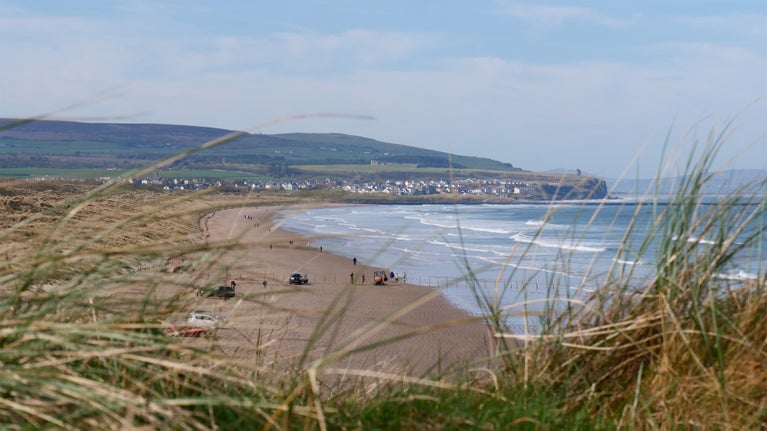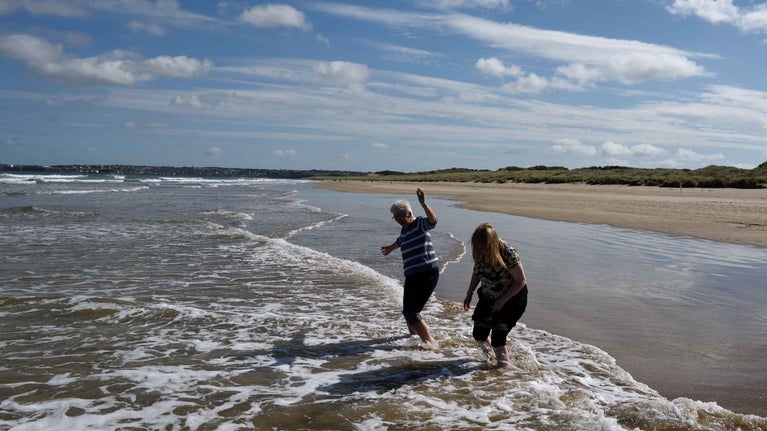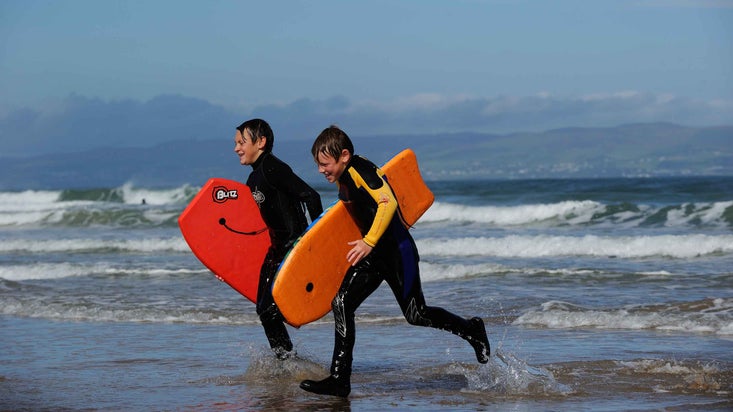Beach safety when visiting Portstewart Strand

Enjoy spending time outside at coastal places? You can help to keep them safe and enjoyable by observing a few simple guidelines during your visit and following the Countryside Code.
When visiting Portstewart Strand, it is important you are aware of some of the safety procedures to ensure a safe visit to the reserve. Below are a few tips on how to stay safe and ensure this landscape stays beautiful:
Beach Safety:
- Choose the lifeguarded section of the beach when available (seasonal June, July & August)
- Know your flags - If you visit a lifeguarded beach, there will be flags on the beach to show you where it’s safe to swim. If you’re planning to swim or bodyboard, stay between the red and yellow flags. For surfboards, stand-up paddleboards or other non-powered craft, go between the black and white chequered flag. You should not swim there.
If a red flag is flying, the water is dangerous. Do not enter the water under any circumstances... - Be aware of the incoming tide.
- Remember that the sand on the beach and within the dunes is constantly shifting. Please avoid digging excessively deep holes, or tunnelling in to the side of the dunes as there is a risk of sand collapsing on top of you. Also be aware of eroding dune cliffs and overhangs as these could collapse at any time and without warning.
- Dangerous objects can wash up on the beach. If you see anything, do not touch or remove it but note the location using ‘what three words’ and report it immediately to a member of staff, call 02870836396 and the police on 999.
- Approved water craft activities are only permitted beyond post 10 in the month of June, July and August.

Care for the coast and countryside
Issues such as littering, wildfires and fly-camping can all cause significant harm to landscapes and wildlife. With your help, these problems can be avoided so that these places can be protected for generations to come.
When you visit the coast and countryside, we ask that you please follow the Countryside Code.
Countryside Code top tips
- Please camp considerably
Overnight stays are not allowed. Please use designated campsites if you’d like to stay the night - Leave barbecues at home
No fires please. You’re welcome to have a picnic but please don’t have a barbecue unless at designated area which can be located at main car park or Keel Point car park. - Keep to the path
Protect the places you love. Help prevent lasting damage by staying on the paths. - Leave no trace
Help us care for these special places by leaving them as you find them.
Respect other people
- Consider the local community and other people enjoying and working in the outdoors.
- Park carefully so access to gateways and driveways are clear.
- Leave gates and property as you find them.
- Follow marked paths and local signs.
- Be nice, say hello.
Protect the natural environment
- Leave no trace of your visit, take all your litter home.
- Take care with barbecues and fires – only use in designated areas.
- Keep dogs on leads at all times.
- Dog poo – bag it and bin it – any public bin will do.
- Dog training area beyound post 10
Enjoy the outdoors
- Enjoy your visit, have fun, and make a memory.
- Be prepared, check local conditions and what facilities are open.

Barbecues
Why can’t I bring a barbecue?
The countryside can become very dry during the spring and summer months, which creates the perfect conditions for fires to ignite and quickly spread. Even a small spark from a barbecue or campfire can cause serious wildfires and devastate important wildlife habitats.
Wildfires also put a lot of pressure on the emergency services, and endanger local communities and wildlife. Although there are a very small number of designated barbecue areas at some of the places we care for, for instance on concrete surfaces where the risk of fire is low, these should not be used during periods whilst there is significant fire risk.
Please think of others; think of the wildlife; think of our emergency services; and don’t bring barbecues or start campfires at the beach or in the countryside.
Please keep to the paths and trails
There are thousands of miles of walking, cycling and horse-riding routes to explore all around England, Wales and Northern Ireland. Some of these trails run through crop fields or environmentally sensitive locations, so please always keep to the path or trail to avoid damaging the surrounding area.
If you’re exploring a new trail then it’s worth taking a map to make sure that you’re following the correct route, and don’t forget to look out for local signs and waymarkers as well.

Please take litter home with you
Please take all litter home with you and use appropriate bins provided. As well as spoiling the beauty of landscapes such as these, litter can also be extremely dangerous for wildlife which can easily become entangled or mistake it for food. It can also act as fuel for wildfires.
If you do have a picnic or produce any other litter during your visit, please keep hold of it until you find a bin, or take it home with you.

Water craft activities
Visitors can enjoy water craft activities at Portstewart Strand between the months of June, July and August.
To ensure you have the correct permit and documentation before visiting, please contact our team via email: portstewart@nationaltrust.org.uk

Things to do at Portstewart Strand
Spend the day on one of Northern Ireland’s finest beaches. Venture out for a walk along the strand, wander through the 6,000-year-old dunes and spot seasonal wildlife.